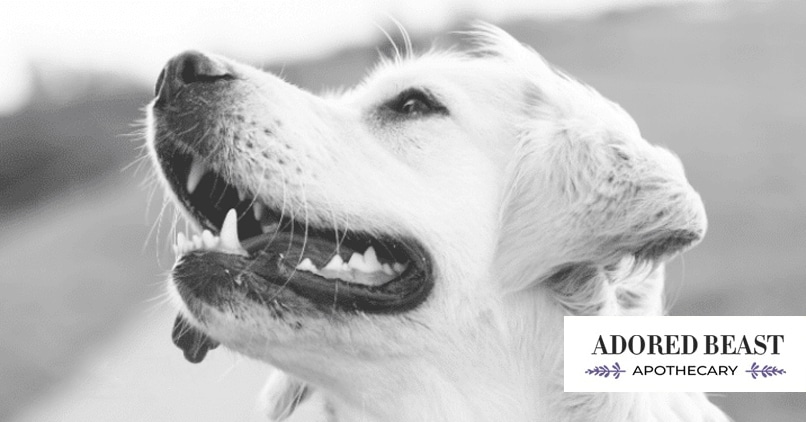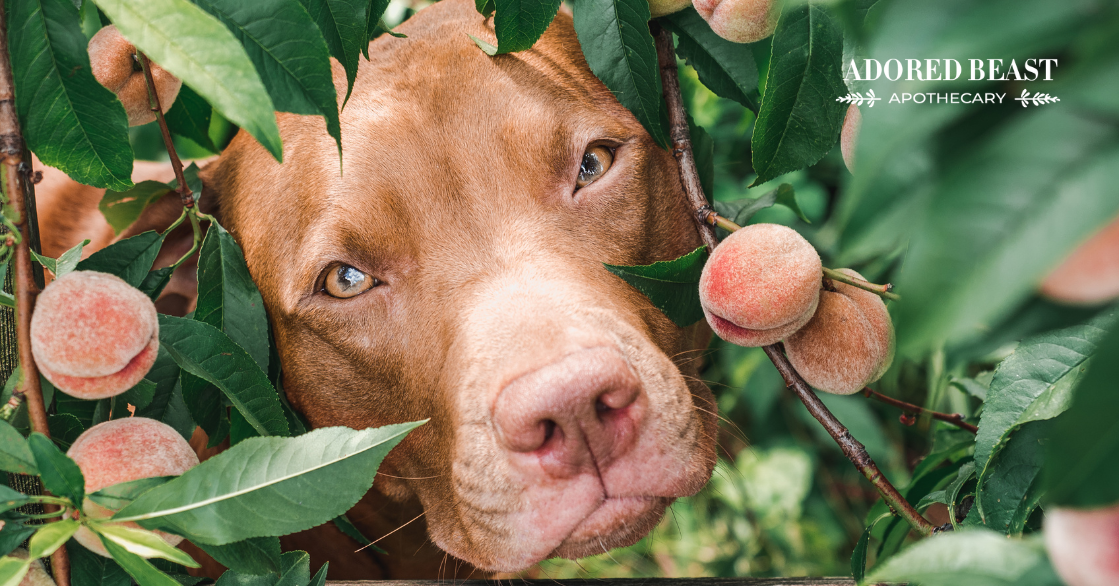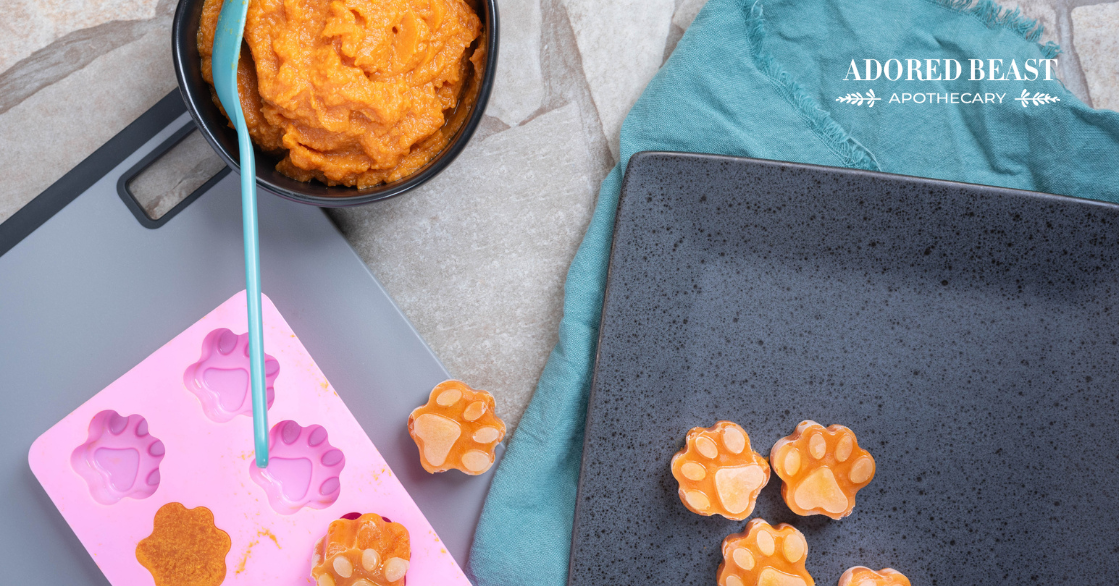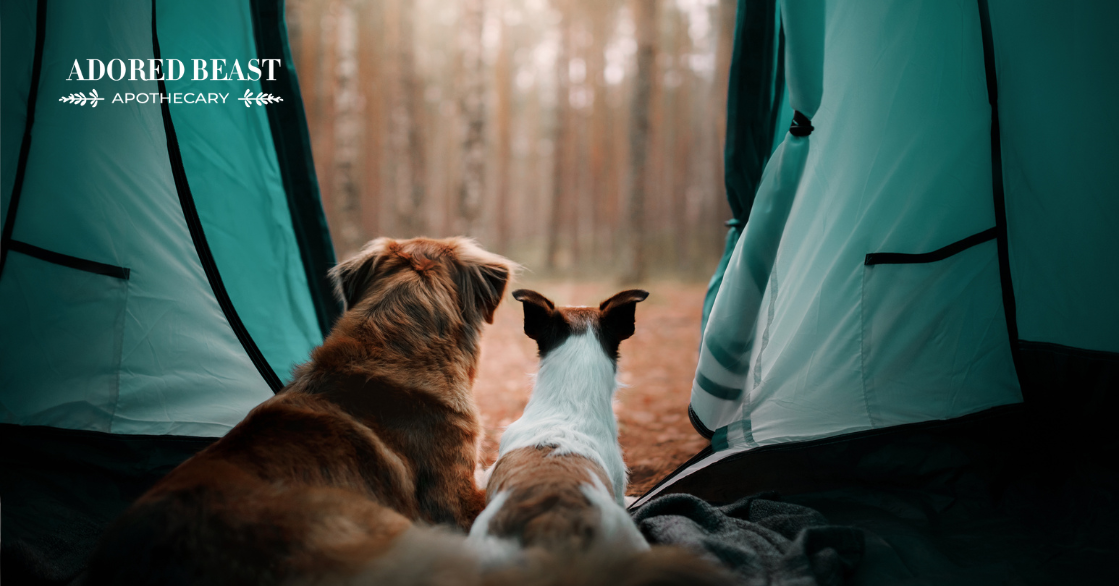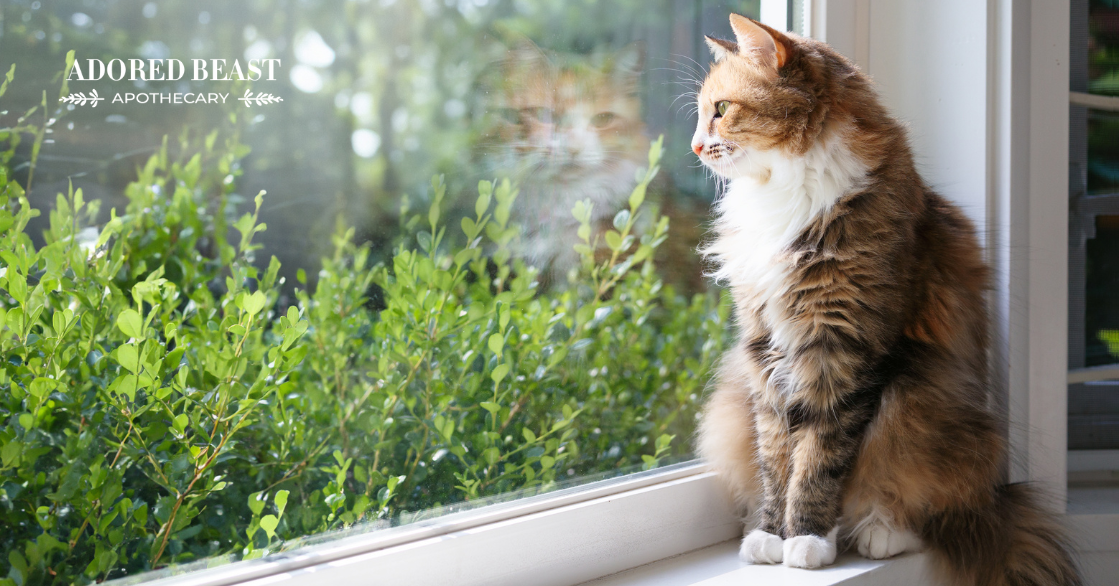Do you clean your dog’s teeth?
Some (but not many) pet parents clean their dogs’ teeth on a daily basis! That’s so awesome to hear, even if they are the minority. Others may do it on a semi-regular basis. Others, well, you get the picture I think. My biggest fear when it comes to dog dental health is that people don’t actually realize how important it is to overall health. Sure, if you don’t brush you dog’s teeth they may have stinky breath, but it actually goes way beyond that. Things like tartar build up, gum disease, and even more serious issues with the heart, lungs, or kidneys can come from not paying enough attention to your pup’s mouth.
In my experience, dogs who eat a diet filled with fresh foods and raw bones naturally have better oral health. I’ve also found that probiotics play a big role in keeping your dog’s mouth and all those chompers healthy.
Probiotics for Dog Dental Health
You may already know that I’m obsessed with the microbiome and gut health. Pre and probiotics are a love of mine. It isn’t just that probiotics are good for the gut though, they can also really help to repopulate the good bacteria and restore the natural microbial balance in the mouth. In fact, it’s been proven that they slow the growth of bad bacteria that can cause common dental diseases like periodontal disease and halitosis (that’s chronic bad breath – not just typically doggie breath).
To help with my animals’ oral hygiene, I make a simple paste using coconut oil and Love Bugs. That’s literally it. The Love Bugs help strengthen that microbiome in the mouth and the coconut oil has natural antibacterial and anti-inflammatory properties – they’re the perfect match!
Love Bugs Probiotic Dental Paste
It’s super easy to make this. Ready?
- Small Dog (or Cat) – mix together 1 tsp of coconut oil and 1/16 tsp of Love Bugs
- Large Dog – you may need more, up to a tablespoon
Try not to make too much, but if you do, be sure to keep it in the fridge and use it within 12 hours to help the probiotics stay viable.
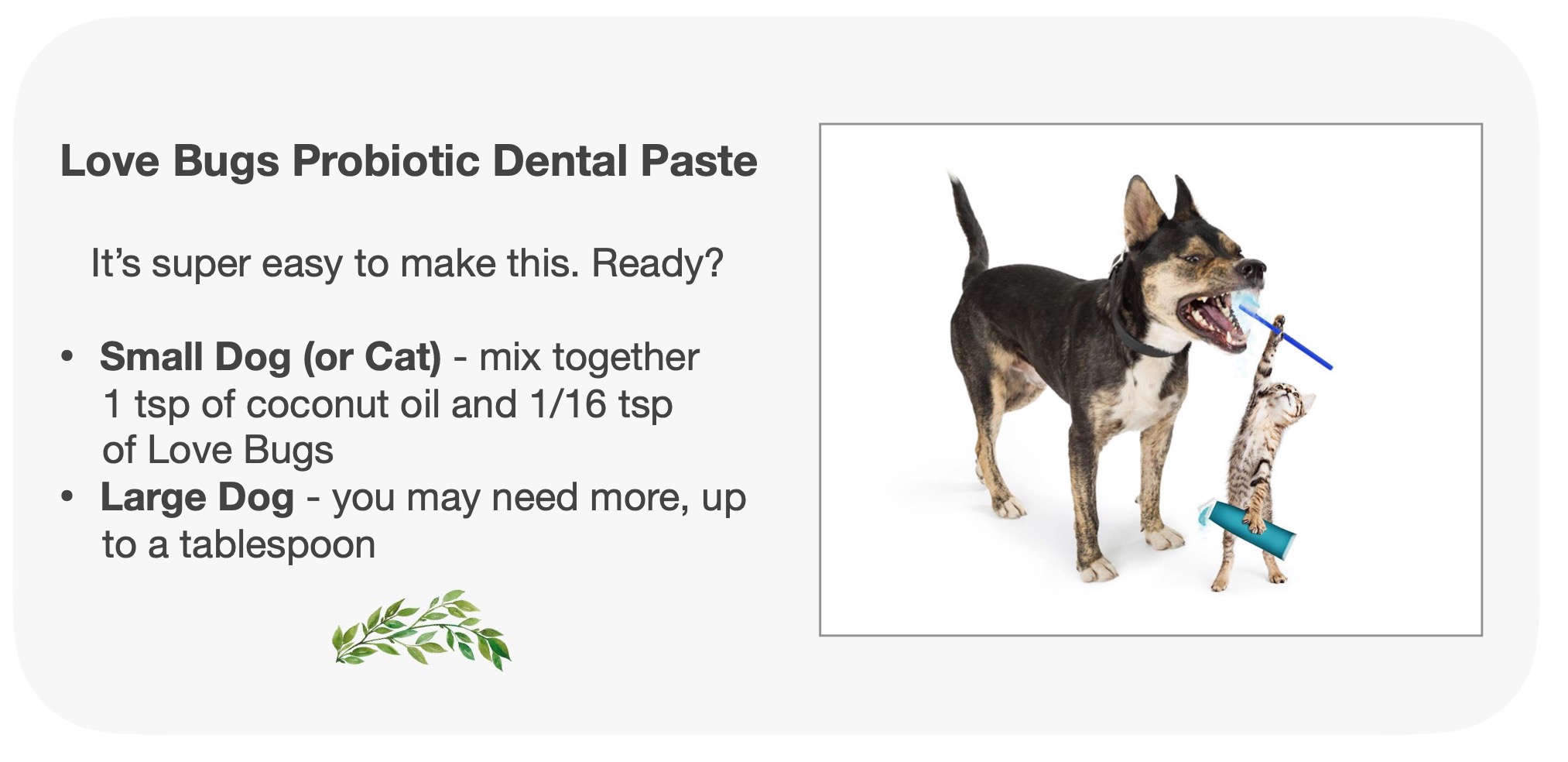
For the coconut oil, you don’t need to melt it. If the coconut oil is chunky, that’s honestly even better because it makes it easier to get a good amount on your finger. Once it’s well mixed together, take a small amount on your finger and gently massage in and around your animal’s teeth. You can even use a piece of cheese cloth or first aid gauze if you like for added texture. Remove from the jar the entire amount you need so that you do not put your finger back in and contaminate the paste.
While you’re in there, gently rub the teeth and all along the gum line (don’t neglect those gums!). Now, some dogs will tolerate this even if they don’t really like it. If you can, do it regularly and this will take some of the stress out of it. Just do your best. Do it as often as you can, again, very gently. For fearful or sensitive personalities or elderly animals, try doing just a 1/4 of the mouth at a time to make it a fun experience.
If you have the ability to get right in there, that’s best. However, if your animal is really fearful, for whatever reason, don’t force it. Some animals just can’t handle your hands in their mouth, whether from past experiences or just because they’re adverse to the feeling. In this case, you can try coconut oil and Love Bugs popsicles – just add the recipe to an ice cube container and freeze. You may want to add some of your favorite bone broth for flavor. Or, just put a little Love Bugs in the water bowl. We don’t want to cause any more stress in our animals, and this takes the pressure off. The probiotics will still get to where they need to be!
Raw Bones for Pet Dental Health
Want to know what else is really great for pet dental health? Raw bones!!! It’s so cool because bones have calcium and teeth are supported with both! Raw bones are an amazing way to help keep teeth clean and healthy, exercise the jaw muscles and helps reduce stress.
One of the best ways to prevent dental and gum disease (and my favourite) is by offering soft bones to chew on, like chicken and turkey necks. Be prepared, this might gross you out, but think of flossing – well that’s what you want to do with the necks. Put on a rubber glove and hold the neck while your dog or cat chews (cats are actually better at doing this alone than dogs, but you can try). Then pull the neck as far back in your pet’s mouth to try and reach the back molars, then slowly move the neck to the front of the mouth, then to the back of the other side and repeat. You can do this as long as you can BEFORE the neck gets too small!
Please make sure you wear a glove so that it does NOT slip from your hand. If your animal feels threatened or gets food aggressive with the bone, then stop right away. DO NOT reprimand them as this is totally natural for some animals. You can do it in tiny spurts and have a treat ready to give them with each break. Like count for 2 seconds, take the bone away and give a treat… this way it becomes a game with reward. If it stays stressful or aggression starts, stop and derail this idea totally and just allow them to chew the neck on their own. Just don’t do it right away – give them a day so the stress level reduces. Always think what they might be thinking or feeling.
Professional Cleanings
If your animal’s teeth need professional attention here are some of the guidelines we used in our holistic veterinary clinic :
1. Hand Scaling
Many veterinarians (including holistic vets) do not believe in hand scaling, but it is my personal experience that it’s proven to be very effective and it’s what we did at our practise.
You want a qualified tech who is really patient and does a high pressure rinse with coconut oil and hypericum solution or water and hypericum solution. We always recommend it be done in four sessions, starting with half of the top of the mouth then opposite side lower, other side top, then the remaining bottom half so if there are any sensitivities, your dog or kitty can still chew. All at once can be a bit much.
Give Arnica 1M and Hepar Sulphuris 200C twice a day for 7 days after the scale. You can use Aconite 1Mprior to the scaling, or, for those of you in the U.S. and it’s legal, CBD to help them relax.
2. If an Anesthetic is Necessary
A qualified technician should be working with a vet and should be able to assess if this is necessary. Make 100% sure that it is in fact necessary before going ahead with it. I know dogs who go in each and every year for anesthetic cleanings, and I honestly don’t think they need it. There are other options to keep the teeth in good shape (bones, probiotics). The stress of this in immense, so really make sure it is actually needed.
If it is 100% necessary, always get pre-surgery blood work done. Puppies, teens, seniors – always.
If there is an issue with the kidneys or liver then those organs should be supported for 3 months with herbs, a fresh species-oriented diet and homeopathy then retested before the procedure is done!
If there is a concern about periodontal disease or a huge bacterial issue, then while you are supporting the organs you can do arnica 30C, hepar sulphuris 30C and silica 30C twice a day for 2 weeks. If it is helping, do that once per week until the surgery date.
3. Extensive Dental Disease with Many Extractions
Use a board certified dentist as it almost always cuts down on the time your dog will be under anesthetic. Ask around to find a good surgeon that other people liked its always nice to feel as confident as possible going into this.
Again, get proper blood work done beforehand. If your pet is geriatric or their health is compromised, ask for a board certified anesthesiologist to work with the surgeon.
Give 1 dose of Phosphorus 200C right after the surgery to help the liver and kidney detox, in addition to supporting the blood loss. Then give Arnica 1M and Hypericum 1M twice a day for 2-5 days, depending on the amount of work done.
What’s Damaging Your Dog’s Teeth?
Ok, now I’m going to be the Fun Police.
Here are a few things that can cause havoc on your dog’s teeth.
- Stay away from tennis balls. I know, I know, it’s your dog’s favourite game, but I’m not saying don’t play fetch, I’m just saying do not use tennis balls. That fuzzy covering is tough stuff – don’t forget it has to endure heavy tennis matches but it can actually wear your dog’s teeth to the point of the bulb becoming exposed, causing pain when eating. That same fuzz can cause impaction in the gut. So always use a rubber ball and always one that’s too big for you dog to swallow!!
- Do NOT feed smoked bones, cooked bones, or antlers. The process to make these shelf safe and so they do not have to be refrigerated changes the composition of calcium, making them so hard they can easily crack your dog’s teeth or splinter, causing them to lodge in the throat or in the gut!! That’s bad news any way you look at it!! Again, stick with those raw bones.
- Don’t throw stones. Next, I can not tell you the number of dogs I have seen with broken teeth from throwing rocks into lakes and rivers and the dogs actually catching them! Please use rubber balls or frisbees!
At the end of the day, we all want what is best for our furry family. This includes pet dental health! Doing your homework and being their healthcare advocate is the most proactive and safest way to go.
Here’s to the health of our animals, from tooth to tail.

